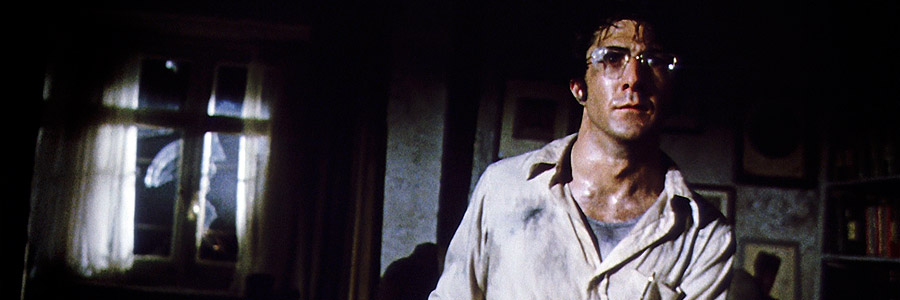
Straw Dogs

STRAW DOGS (MOVIE)
ABC Pictures/Talent Associates/Amerbroco
Release date: November 3rd, 1971
Running time: 118 minutes
Director: Sam Peckinpah
Writers: David Zelag Goodman, Sam Peckinpah, Gordon Williams (novel)
Cast: Dustin Hoffman, Susan George, Del Henney, Ken Hutchison, Sally Thomsett
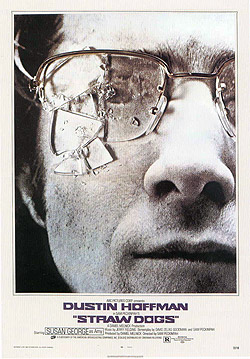
Whilst studying for my A-Levels back in 2000, my class spent a few weeks looking at the film censorship in the UK. We spent one session hearing about the treatment of rape in films such as the horror film I Spit on Your Grave (1978) and Sam Peckinpah’s Straw Dogs (1971). The film had, at this point, never been given a home video release in the UK due to the ambiguous nature of the rape scene which seemed to eroticise the act.
A year before my studies, the BBFC had refused a newly cut version of the film on the basis that they had removed the worst of the rape and as such there was only the more eroticised element of it. In 2002 the uncut version of Straw Dogs was finally given the go-ahead for release after the BBFC consulted with “leading clinical psychologists specialising in work with sex offenders and to a panel of members of the public” and in their statement declared that:
Regardless of the controversy, the film is regarded by many as a classic and now, 41 years after its initial cinematic release and over a decade after I first heard about it, I finally got the chance to see it and decide for myself.
The plot sees mathematician David Sumner (Dustin Hoffman) and his English wife Amy (Susan George) moving back to the village she grew up in to now live in her father’s old house whilst her husband writes his book. Outside they have a group of local men working on fixing up their garage, all of whom spend a deal of their time salivating and lusting after Amy – including her old flame Charlie (Del Henney).
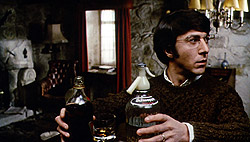
The locals clearly don’t like David and he goes little way to winning them over when he orders “any American cigarettes” or walks in front of local men playing darts – their dislike is embodied by the cat whom David finds hung by the neck in his closet. Amy begs him to confront the men responsible, but David chickens out and ends up going on a hunting trip with them the next day. Whilst out, Charlie sneaks off and makes his way back to the farm and forces himself upon Amy in the scene which is responsible for most of the controversy surrounding the film.
He’s joined by his friend Norman Scutt (Ken Hutchison) who also rapes Amy as Charlie holds her down. Then, the locals besiege the farm to get at a local man whom they suspect (and we’re sure) of harming a young girl. David refuses to let them in and horrifically bloody battle plays out, all the while, the rape is unbeknownst to David.
So, to start with the good: Dustin Hoffman is absolutely fantastic as David Sumner, who begins as a cowardly bookish type who’s ill at ease in the surrounding of the English countryside – especially in the bleak, dull tones in which John Coquillon shoots it. His relationship with his wife is difficult but his character shift from flawed and denying of his failings to the force he becomes in the finale is believable. This is a great achievement given the change he must go through in such a short time.
Straw Dogs is also incredibly well put together. The difficulties David and Amy have in their relationship and the threatening locals stopping to unabashedly stare at Amy as she gets of the car serve to create an all-encompassing sense of foreboding. There are some brilliantly tense scenes, not least when David is preparing to confront them about the cat. This side of things is slapped on (a little thickly 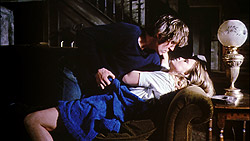 perhaps) by the goings on in the village: the simple local man who once made a mistake with a young girl; the teenage strumpet with a crush; the volatile, alcoholic father of said strumpet – you don’t need to be a psychic to see what’s going to happen there.
perhaps) by the goings on in the village: the simple local man who once made a mistake with a young girl; the teenage strumpet with a crush; the volatile, alcoholic father of said strumpet – you don’t need to be a psychic to see what’s going to happen there.
Peckinpah and his editors, Davies, Lawson and Spottiswoode, also did a great job of showing the torment Amy goes through after her rape. Using very brief cuts back to the act during other scenes shows her mental state and the fact that it’s haunting her.
The film does have some considerable failings though which would, for this reviewer, challenge its place as a classic. These have to do, pretty exclusively with gender: I would question its portrayal of what masculinity is, and much more seriously I’ve problems with the inherent misogyny of the piece.
It’s pretty clear from early on what Sam Peckinpah considers to be a real man. David is admired by the young girl in a short skirt, Janice (Sally Thomsett), but he’s very much an intellectual and as such is not in the slightest bit masculine. He’s condemned by Amy for not being manly enough to fix the roof of the garage himself (which would negate the need for the workers outside), and is constantly branded by her as a coward both in his life in general and the way he behaves in the village. He also drinks whiskey on the rocks – not a pint of bitter – and has never been hunting or shot anything with a gun. The one way to become a man is to kill or maim several drunken murderers as they try to force their way into his house. Whilst David’s final line may 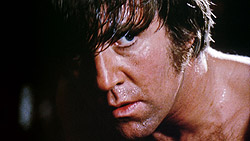 suggest he’s gone past the point of no return from, this doesn’t undo the general feeling of the film which asserts a particular kind of masculinity as required to be victorious.
suggest he’s gone past the point of no return from, this doesn’t undo the general feeling of the film which asserts a particular kind of masculinity as required to be victorious.
It’s the portrayal of Amy, however, that really bothered me, both throughout the film and, crucially, in the rape scene. Amy is essentially a possession of David’s, she has little character development and plays the role for the first half of the film like a moody teenage girl who wanders around without a bra on and childishly tries to disrupt David’s work. In the scene in which David finds the dead pet she claims they (the locals) are showing David they can get into his bedroom – by extension, this suggests the upcoming rape of Amy is purely the furthest point of trespass. The fact that David never learns of the rape is also problematic for me as surely without his knowledge it doesn’t serve to emasculate him at all – still, it remains unsaid.
Then we have the rape itself which is the centre of many a debate and the reason for most of the furore regarding censorship. The rape is horrific, not just because of its brutality but because of its misogynistic portrayal of the act and it’s propagation of the myth that “no means yes”. Many reviewers have trivialised the rape and argued that it’s not rape or ignoring it all together.
Personally this whole part of the film left a bitter taste in my mouth given its eroticising of the act in the first attack where Amy may fight to begin with but is clearly experiencing pleasure by the scene’s end.
Although, as the BBFC states, the second act may serve to remind us of the true nature of rape that doesn’t make the first one any less problematic – not only does is set up the possibility that Amy may enjoy the second rape also, but it reduces any impact the first may have had and has led some to consider it a ‘good’ rape.
Straw Dogs is extremely engaging from start to finish but these major problems with it mean that, for me, it will not go down as a classic regardless of the quality of performance and camera work. It’s not the steely eyes of Dustin Hoffman ‘becoming a man’ which I now think about; it’s the awful portrayal of Amy.

Ben Nicholson
Ben has had a keen love of moving images since his childhood but after leaving school he fell truly in love with films. His passion manifests itself in his consumption of movies (watching films from all around the globe and from any period of the medium’s history with equal gusto), the enjoyment he derives from reading, talking and writing about cinema and being behind the camera himself having completed his first co-directed short film in mid-2011.
His favourite films include things as diverse as The Third Man, In The Mood For Love, Badlands, 3 Iron, Casablanca, Ran and Grizzly Man to name but a few.
Ben has his own film site, ACHILLES AND THE TORTOISE, and you can follow him on Twitter @BRNicholson.
© 2022 STATIC MASS EMPORIUM . All Rights Reserved. Powered by METATEMPUS | creative.timeless.personal. | DISCLAIMER, TERMS & CONDITIONS
HOME | ABOUT | CONTACT | TWITTER | GOOGLE+ | FACEBOOK | TUMBLR | YOUTUBE | RSS FEED
CINEMA REVIEWS | BLU-RAY & DVD | THE EMPORIUM | DOCUMENTARIES | WORLD CINEMA | CULT MOVIES | INDIAN CINEMA | EARLY CINEMA
MOVIE CLASSICS | DECONSTRUCTING CINEMA | SOUNDTRACKS | INTERVIEWS | THE DIRECTOR’S CHAIR | JAPANESE CINEMA





